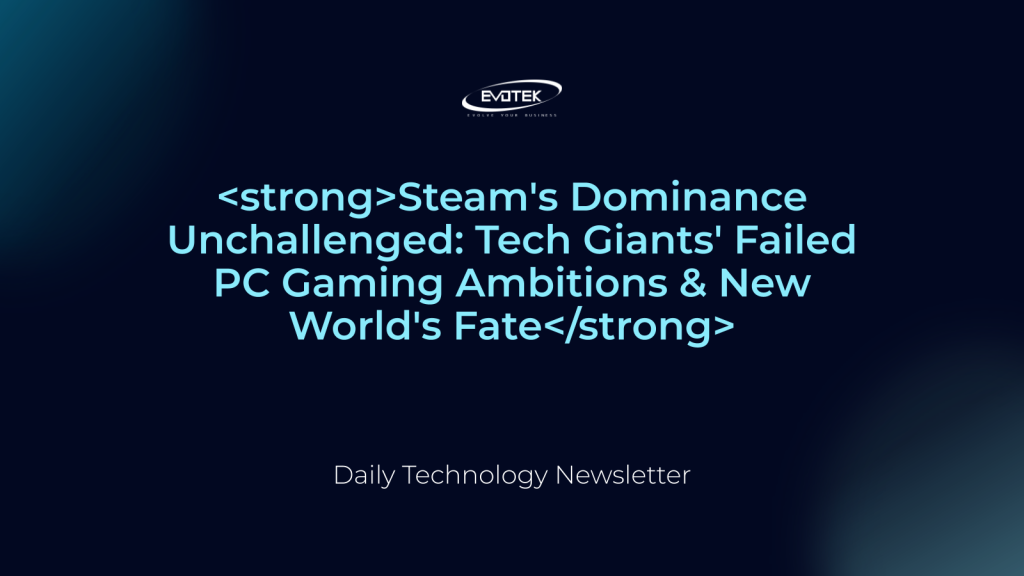The tech industry’s ambitious quest to dethrone Steam as the leading PC gaming platform has largely stumbled, leading to strategic retreats and the premature decline of promising titles. Amazon, a prime example, poured significant resources into its game development studios a decade ago, not merely to publish games, but with the grand aspiration of rivaling Valve’s omnipresent digital storefront. This formidable challenge, however, never truly materialized, ending with a quiet shift in strategy that is now seeing projects like the historical-fantasy MMO, New World, cease major updates and head towards eventual obsolescence.
Amazon’s Gaming Dream: A Platform Play, Not a Developer’s Passion
For many, the news of New World‘s cessation of updates comes as a surprise, given its relative success. Launched in 2021, the MMO capitalized on the pandemic-era surge in online gaming, hitting an impressive peak of over 913,000 concurrent players on Steam. While player numbers naturally stabilized into 2022, New World was far from a failure; it received an expansion in 2023 and a console port in 2024, demonstrating a healthy, albeit modest, player base. It was a genuine foothold in a notoriously competitive genre, a base that could have been nurtured for future growth.
The core issue, however, wasn’t New World‘s performance but Amazon’s underlying intent. Executives, it appears, were less interested in becoming a dedicated MMO developer and more focused on conquering the entire PC gaming market. When that larger ambition faltered, the commitment to specific game projects waned. This pivot is now evident as Amazon shifts focus, reportedly towards more experimental projects, including an “AI-powered” game featuring Snoop Dogg, and layoffs impacting their first-party AAA development efforts.
Google’s Retreat and Microsoft’s Complex Strategy
Amazon isn’t alone in its missteps. Google swiftly retreated from its own PC gaming platform ambitions, closing its in-house studio before releasing any games once it became clear that Stadia wouldn’t replicate Steam’s success. These instances underscore a recurring theme: major tech companies entering the gaming space with platform-centric, revenue-driven goals, often at the expense of genuine, long-term game development.
Microsoft, while still aspiring to a prominent position in PC gaming, presents a more nuanced picture. While releasing games on Steam again, its substantial investment in Game Pass highlights a desire to own the subscription model and ecosystem. CEO Satya Nadella’s acknowledgement of “Steam [building] a massive marketplace on top of [Windows] and done a very successful job of it” reveals an underlying covetousness. The company’s push for “Xbox PC” further illustrates its ambition, yet the commitment to developer sustainability remains a question mark given recent studio closures and layoffs.
The True Cost of Corporate Ambition: Game Developers as Means to an End
The frustration for many in the industry lies in watching these tech giants use talented game developers as leverage for impossible platform-domination goals. Even when studios create popular games, they can be cast aside if they don’t align with broader corporate strategies focused on recurring revenue rather than the craft of game making itself.
Steam’s enduring strength lies partly in its history and its “killer app” origins with titles like Counter-Strike. Attempts by competitors, even Epic Games with its substantial financial backing, have managed only modest dents in Valve’s stronghold. The most honest efforts, it seems, come from companies willing to invest in independent developers and foster innovation, rather than attempting to acquire or dominate the entire landscape.
A Call for Sustainable Game Development
What truly resonates are developers whose existence is justified purely by creating games people want to buy, not by their role in a grand scheme for PC gaming supremacy. Studios like Obsidian, with its century-long plan for RPG development based on realistic profit margins, and Double Fine, creating niche, creative titles, represent a healthier model. However, the shadow of corporate restructuring, layoffs, and “LinkedIn-brained executives” prioritizing short-term margins continues to loom over even legendary studios under larger tech umbrellas.
The irony is profound: PC gaming is bigger than ever. Games like New World don’t have to be abandoned if the companies behind them genuinely commit to the business of making games. As the industry evolves, the hope remains that some parts of the tech sector, unlike Amazon in this instance, will learn the crucial lesson that sustainable success in gaming springs from a true passion for development, not just platform ownership.

 日本語
日本語 한국어
한국어 Tiếng Việt
Tiếng Việt 简体中文
简体中文